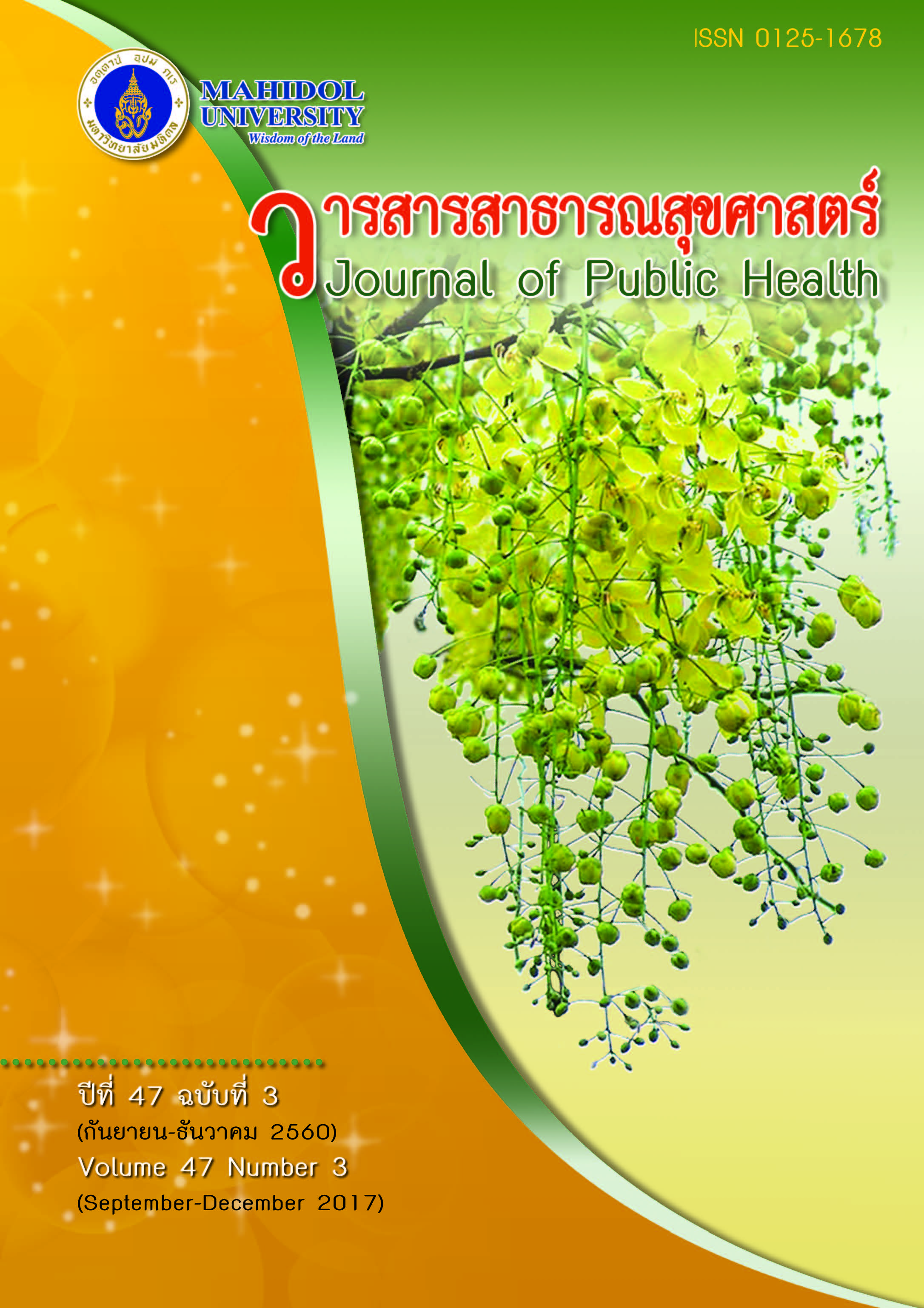ผลของโปรแกรมกำกับตนเองเพื่อควบคุมภาวะน้ำเกินในผู้ป่วยไตวายเรื้อรัง ระยะสุดท้ายที่ได้รับการบำบัดทดแทนไตด้วยวิธีการล้างไต ทางช่องท้องอย่างต่อเนื่อง
Keywords:
ผู้ป่วยไตวายเรื้อรังระยะสุดท้าย, ภาวะน้ำเกิน, แนวคิดการกำกับตนเอง, ล้างไตทางช่องท้องอย่างต่อเนื่อง, end stage renal disease patient, volume overload, self-regulation, continuous ambulatory peritoneal dialysisAbstract
ผลของโปรแกรมกำกับตนเองเพื่อควบคุมภาวะน้ำเกินในผู้ป่วยไตวายเรื้อรังระยะสุดท้ายที่ได้รับการบำบัดทดแทนไตด้วยวิธีการล้างไตทางช่องท้องอย่างต่อเนื่อง
การวิจัยกึ่งทดลองแบบสองกลุ่มวัดผลก่อน-หลังนี้ มีวัตถุประสงค์เพื่อศึกษาผลของโปรแกรมกำกับตนเองเพื่อควบคุมภาวะน้ำเกินในผู้ป่วยไตวายเรื้อรังระยะสุดท้ายที่ได้รับการบำบัดทดแทนไตด้วยวิธีการล้างไตทางช่องท้องอย่างต่อเนื่อง ตัวอย่างจำนวน 44 คน แบ่งเป็น 2 กลุ่ม ๆ ละ 22 คน กลุ่มทดลองได้รับโปรแกรมที่ประยุกต์ใช้แนวคิดการกำกับตนเอง ระยะเวลา 9 สัปดาห์ กิจกรรมประกอบด้วยการให้ความรู้ การฝึกทักษะการสังเกตตนเอง การตัดสินใจ การแสดงปฏิกิริยาต่อตนเอง และการสนับสนุนการสังเกตตนเองอย่างต่อเนื่อง เพื่อควบคุมภาวะน้ำเกิน เก็บข้อมูลก่อน-หลังการทดลองด้วยแบบสัมภาษณ์ และวัดภาวะน้ำเกินในสัปดาห์ที่ 1, 5, และ 9 วิเคราะห์ข้อมูลด้วยสถิติเชิงพรรณนา และสถิติเชิงอนุมาน ผลการวิจัยพบว่า หลังทดลอง กลุ่มทดลองมีความรู้เกี่ยวกับการบริโภคอาหารที่มีโซเดียมและน้ำ การรับรู้ความสามารถของตนเองและความคาดหวังในผลดีของการควบคุมภาวะน้ำเกิน พฤติกรรมการบริโภคอาหารที่มีโซเดียมดีขึ้นกว่าก่อนการทดลองอย่างมีนัยสำคัญทางสถิติ (p < 0.05) ยกเว้นพฤติกรรมการบริโภคน้ำ (p = 0.756) และดีกว่ากลุ่มเปรียบเทียบ (p < 0.05) ยกเว้นความคาดหวังในผลดีฯ (p = 0.034) ทั้ง 2 กลุ่ม มีภาวะน้ำเกินแตกต่างกันอย่างชัดเจนในสัปดาห์ที่ 9 (p = 0.033) ดังนั้นโปรแกรมนี้จึงสามารถนำไปบูรณาการกับกิจกรรมการพยาบาลในระบบปกติของโรงพยาบาลต่อไป
Effects of a Self-Regulated Program to Control Volume Overload among Patients with End Stage Renal Disease Receiving Continuous Ambulatory Peritoneal Dialysis
This quasi-experimental research aimed to study the effects of a self-regulated program to control volume overload among patients with end stage renal disease receiving continuous ambulatory peritoneal dialysis. A sample of 44 patients was divided in two groups of 22 patients each. The experimental group received the self-regulated program for 9 weeks. The program activities of the program included knowledge, skills training on self-observation, decision making, self-reaction and supported self-observation continuously, to control volume overload. Data were collected pre- and post intervention by interviewing and measuring volume overload at weeks 1, 5 and 9. Data was analyzed using descriptive and inferential statistics. The research results showed that after experimentation, the experimental group gained a significantly higher level of knowledge than the comparison group regarding consuming food containing sodium and water, perceived self-efficacy, outcome expectations of the benefits of controlling volume overload and consuming food containing sodium than before the experiment (p<0.05) except for water consumption behavior (p=0.756) (p<0.05), and outcome expectations of the benefits of controlling volume overload (p=0.034). Additionally, a significant difference was found concerning volume overload between groups at week 9 (p=0.033). Thus, this self-regulated program to control volume overload could serve as an alternative to be integrated in hospital treatment.
Downloads
Published
Issue
Section
License
Creative Commons License CC-BY-ND


